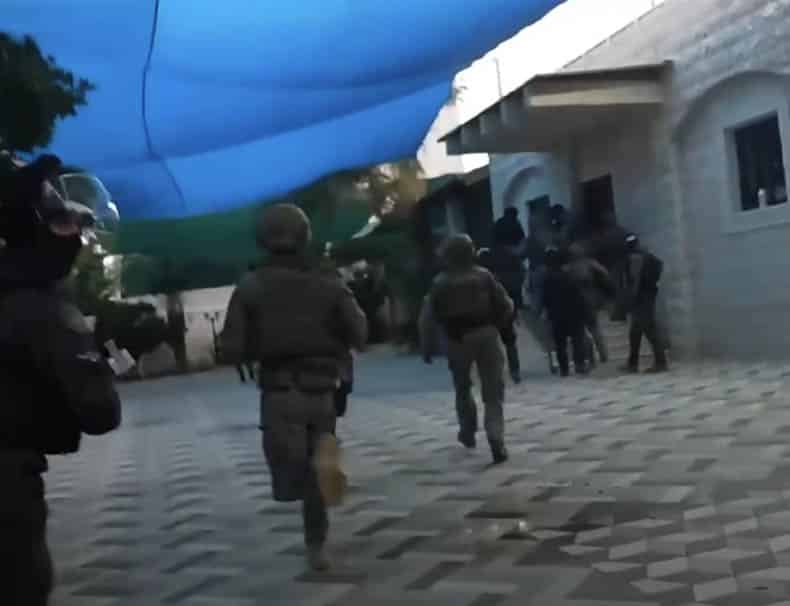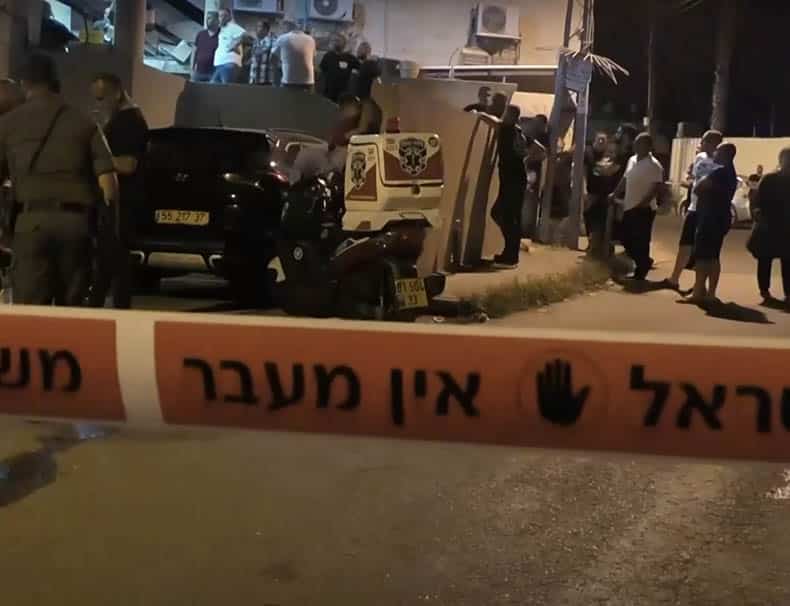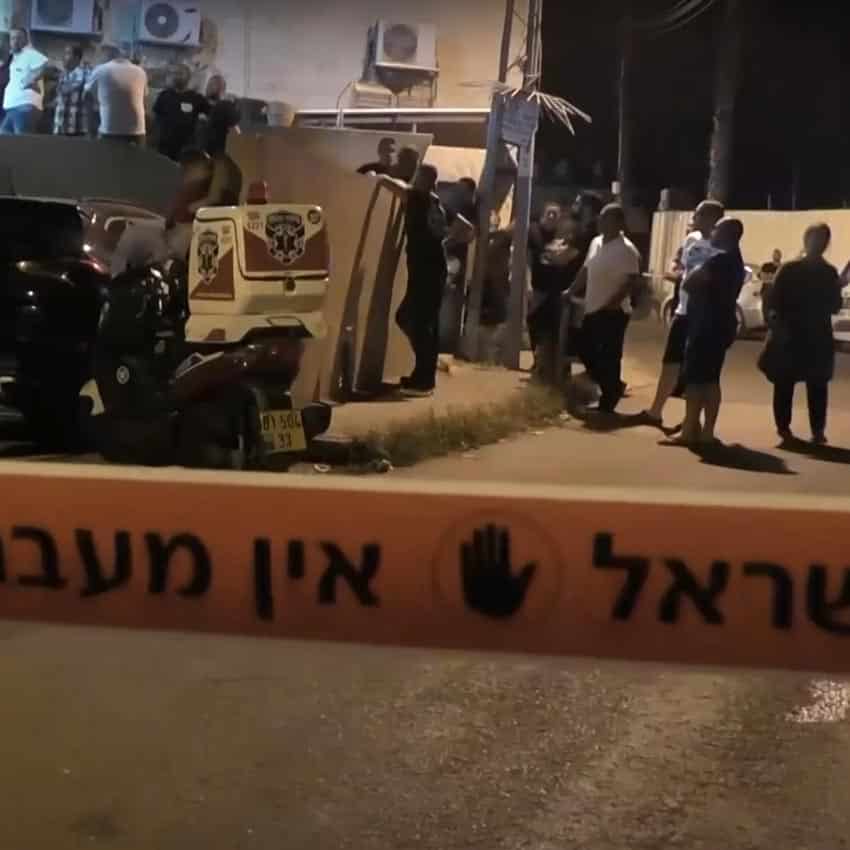June began with three more murders in the Arab sector — two from a car bomb explosion in Jaljulia and another from a shooting in Lod. Before that, two Arab residents of Lod were murdered, along with three others who were killed on May 29 in three separate shooting incidents in Tamra, Ar’ara, and Kafr Kanna. More and more scenes in a never-ending cycle of death — and the State of Israel is doing nothing. This is not just the routine violence of recent years but an escalating and intensifying reality: a reality in which the value of life in Arab society has long been abandoned, and the authorities are not genuinely attempting to stop the tide.
Since the beginning of 2025, ninety-seven Arab citizens have been murdered in Israel, and it’s only June. In 2024, the total number was 230; two years earlier, it was 111; in 2021, it was 126; and in 2020, it was 109. This represents a sharp and consistent increase in recent years, and this figure underscores not only the severity of the crisis but also the failure of all relevant authorities in their attempts to address the phenomenon.
On June 5, an emergency meeting of the Ministerial Committee for Dealing with Crime in Arab Society was held, chaired by Prime Minister Benjamin Netanyahu. A senior representative from the Shin Bet also participated, warning that this is “a real threat to national security.” According to him, “If a confrontation breaks out, as happened during Operation Guardian of the Walls (May 2021), it will be far more deadly due to the quantity, quality, and distribution of illegal weapons and criminal organizations. They possess grenades, military-grade weapons, and even missiles. It’s not just handguns,” He warned that this weaponry “could be used in times of internal emergency or parallel with an external security flare-up.”
In the following, I will offer the broadest possible perspective — encompassing security-related, governmental, social, economic, and historical aspects — on this severe phenomenon and its consequences, to clarify that this is no longer a sectoral issue but a national problem that threatens the entire State of Israel. The time has come to move from talk to action, with structured and funded plans in place.
It is important to remember that the victims of the murders in Arab society are young and old, women and men, and even children. The data, as I have presented, alone shows that this is not about isolated criminal events, but rather an accelerated process of deterioration. But the problem is not just the scale or numbers. These are violent incidents, some of them carefully planned, involving the use of sophisticated firearms, and in some cases, in crowded or public places. There is hardly a single Arab town or village that has not been affected, and not only criminal elements are at risk, but also mayors, public figures, local election candidates, and innocent citizens who have been harmed or threatened. To this, we must add the serious phenomena that characterize the Bedouin sector, particularly in the south and north for years, and in recent years, also spreading to central Israel, including a lack of governance, violence, crime, and protection rackets.
Warnings Left Hanging
According to security officials, there are currently tens of thousands of illegal weapons on the streets of Arab communities. A large portion of them originated from the IDF or smuggling across the borders with Jordan, Lebanon, and Egypt. This is an unprecedented quantity, and since October 2023, the trend has continued to worsen. The combination of illegal weapons, extremist ideology, organized violence, and lack of police control is dangerous, posing strategic threats to Israel. As the Shin Bet representative clarified in the latest discussion: “We may find ourselves in a situation where, during a conflict with Hamas or Hezbollah, an internal front also opens up within the country.”
The fight against crime in Arab society is not a new challenge. Already in the early 2000s, senior Shin Bet and police officials warned of the dangers in the convergence of interests between crime organizations, clans, nationalist-religious ideology, and illegal weapons. Former Shin Bet head Yoram Cohen cautioned in 2006 that this posed a threat that “could exceed the bounds of criminal activity and become a security threat.”
Yet successive Israeli governments have invested few resources, and even when plans and declarations were made, they usually fizzled out. This was due to a combination of poor priorities, political pressure, the fragmentation of responsibilities among various bodies, and even claims of reluctance regarding the “excessive” involvement of the Shin Bet. Short-term bodies were formed and dismantled—the most recent being the Arab Community Security Headquarters, which was disbanded in 2023 by the current Minister of National Security, Itamar Ben-Gvir. The dissolution of the body also marked a de facto withdrawal of the state from centralized efforts to address the issue, and the result, despite disturbing data and warnings of even graver consequences if immediate action is not taken, is that no genuine, multi-system emergency plan exists to address Arab crime. When such a plan is finally implemented, it must include actions in the areas of education, employment, planning and construction, police oversight, intelligence monitoring, economic sanctions, and support for local authorities.

Internal Responsibility and Economic Damage
Alongside the accusations directed at the government and various establishment bodies, it is also essential to acknowledge the responsibility of Arab society, particularly its leadership, for the current state of affairs. Its leaders—political, religious, and civic—bear a moral, legal, and public responsibility to denounce the violence, cooperate with law enforcement, and build community-based alternatives. Yet it seems that they are far more engaged in fighting for the residents of Gaza, Hamas, and related Palestinian issues than in rescuing the Arab population from the existential problems threatening both it and the state.
It is well known that in some cases, Arab municipal leaders fear cooperating with enforcement authorities due to concerns about retaliation. There have already been murders, including of public figures, and suspicions and claims have been raised about ties between certain elected officials and organized crime. As long as the full spectrum of Arab public leadership does not take a stand and lead their community in uniting against the criminal elements living among them and disrupting their lives and future, the law enforcement agencies will not be able to eliminate the phenomenon on their own—especially given that, alongside the crime and murders, there exists at least implicit legitimacy for violence, including shootings at weddings and celebrations, which have also resulted in injuries and deaths.
The consequences of violent incidents go beyond personal safety. This is also an enormous economic problem: construction companies, small businesses, entrepreneurs, and local council heads—not only Arab but also Jewish—are forced to pay protection money to crime organizations. Municipal tenders are affected, contractors are hesitant to participate in development plans, and even government infrastructure projects are frozen or delayed. The damage to the economy is estimated at billions of shekels per year, factoring in productivity loss, insurance, risk, security, and “violence premiums.” This crime is often intertwined with money laundering, smuggling, drug and arms trafficking, and the effective takeover of economic power centers.
Standing Together Against Evil
In light of recent developments, the possibility is being examined to declare specific criminal organizations in Arab society as terrorist organizations, according to criteria to be determined by the Attorney General. This would entail applying the Counter-Terrorism Law to all members of the organization, including asset seizure, restrictions on economic ties, and more severe penalties. It is an extraordinary but necessary step given the growing negative impact of these crime groups on both Arab and Jewish publics, on governance, and on the State of Israel’s very ability to ensure sovereignty, law, and order.
As Shin Bet officials and others have warned for years, violence in Arab society is not a local threat but a first-order national challenge. It is a social, security, economic, and political threat, and neglecting it may lead to the collapse of law and order in entire areas, the breakdown of Arab citizens’ trust in the state, and an internal threat during times of war or external crisis.
This is the moment for a comprehensive national plan to be led by the Prime Minister. This strategy includes regular follow-up discussions, the allocation of financial resources, and the deployment of the workforce. The state must now fulfill its responsibility, strengthen the police and Shin Bet, demand deterrent enforcement from the judicial system, and also demand courageous leadership from Arab society itself — one that will stand up to the evil from within. Any delay will endanger us all.








